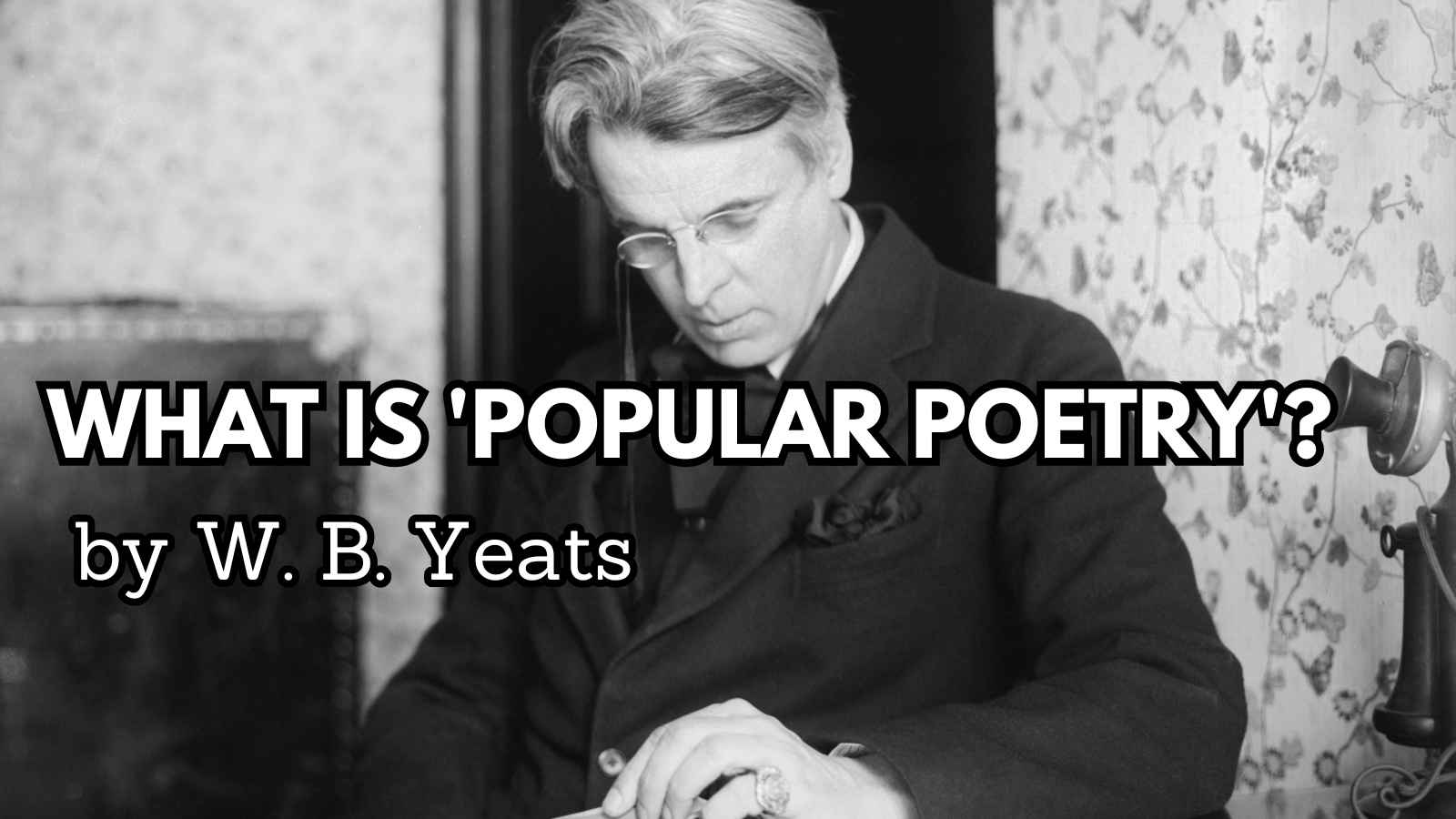Dear Smith,— You inform me that you desire to be a journalist, and you are kind enough to ask my advice. Well, be a journalist, by all means, in any honest and honourable branch of the profession. But do not be an eavesdropper and a spy. You may fly into a passion when you receive…
Historic Articles by Authors
Art and the Handicraftsman by Oscar Wilde
Art and the Handicraftsman by Oscar Wilde PEOPLE often talk as if there was an opposition between what is beautiful and what is useful. There is no opposition to beauty except ugliness: all things are either beautiful or ugly, and utility will be always on the side of the beautiful thing, because beautiful decoration is…
What is Popular Poetry? by W. B. Yeats
W.B. Yeats challenges literary conventions in ‘What is Popular Poetry?’, exploring authentic Irish verse and how true poetry transcends cultural divisions
About War Poetry by George Herbert Clarke (1917)
About War Poetry by George Herbert Clarke (1917) Because man is both militant and pacific, he has expressed in literature, as indeed in the other forms of art, his pacific and militant moods. Nor are these moods, of necessity, incompatible. War may become the price of peace, and peace may so decay as inevitably to…
Of Love by Francis Bacon
THE stage is more beholding to love, than the life of man. For as to the stage, love is ever matter of comedies, and now and then of tragedies; but in life it doth much mischief; sometimes like a siren, sometimes like a fury. You may observe, that amongst all the great and worthy persons…
What is Genius by Joseph Addision
—Cui mens divinior, atque os Magna sonaturum des nominis hujus honorem. Hor., Sat. i. 4, 43. On him confer the poet’s sacred name, Whose lofty voice declares the heavenly flame. There is no character more frequently given to a writer than that of being a genius. I have heard many a little sonneteer called a…
Mark Twain Autobiography: On Duels and Shakespeare
In those early days duelling suddenly became a fashion in the new Territory of Nevada, and by 1864 everybody was anxious to have a chance in the new sport, mainly for the reason that he was not able to thoroughly respect himself so long as he had not killed or crippled somebody in a duel…
Charles Dickens a Letter to His Wife
My dearest Love, I received your welcome letter on arriving here last night, and am rejoiced to hear that the dear children are so much better. I hope that in your next, or your next but one, I shall learn that they are quite well. A thousand kisses to them. I wish I could convey…
Percy Bysshe Shelly on Beatrice Cenci by Guido Reni
On my arrival at Rome I found that the story of the Cenci was a subject not to be mentioned in Italian society without awakening a deep and breathless interest: and that the feelings of the company never failed to incline to a romantic pity for the wrongs, and a passionate exculpation of the horrible…
True and False Humour by Joseph Addison
Nothing so foolish as the laugh of fools. Among all kinds of writing, there is none in which authors are more apt to miscarry than in works of humour, as there is none in which they are more ambitious to excel. It is not an imagination that teems with monsters, a head that is filled…
Truthfulness by Charles Dudley Warner
Truthfulness is as essential in literature as it is in conduct, in fiction as it is in the report of an actual occurrence. Falsehood vitiates a poem, a painting, exactly as it does a life. Truthfulness is a quality like simplicity. Simplicity in literature is mainly a matter of clear vision and lucid expression, however…
A Little on John Dyer by Samuel Johnson
John Dyer, of whom I have no other account to give than his own letters, published with Hughes’s correspondence, and the notes added by the editor, have afforded me, was born in 1700, the second son of Robert Dyer of Aberglasney, in Caermarthenshire, a solicitor of great capacity and note. He passed through Westminster school…
A Mountain Town in France (1879) by Robert Louis Stevenson
Le Monastier is the chief place of a hilly canton in Haute Loire, the ancient Velay. As the name betokens, the town is of monastic origin; and it still contains a towered bulk of monastery and a church of some architectural pretensions, the seat of an arch-priest and several vicars. It stands on the side…
Shakespeare; or The Poet by Ralph Waldo Emerson
1. Great men are more distinguished by range and extent, than by originality. If we require the originality which consists in weaving, like a spider, their web from their own bowels; in finding clay, and making bricks, and building the house; no great men are original. Nor does valuable originality consist in unlikeness to other…
Dante, the Divine Poet by Alice Birkhead
There were still Guelfs and Ghibellines in 1265, but the old names had partially lost their meaning in the Republic of Florence, where the citizens brawled daily, one faction against the other. The nobles had, nevertheless, a bond with the emperor, being of the same Teutonic stock, and the burghers often sought the patronage of…
